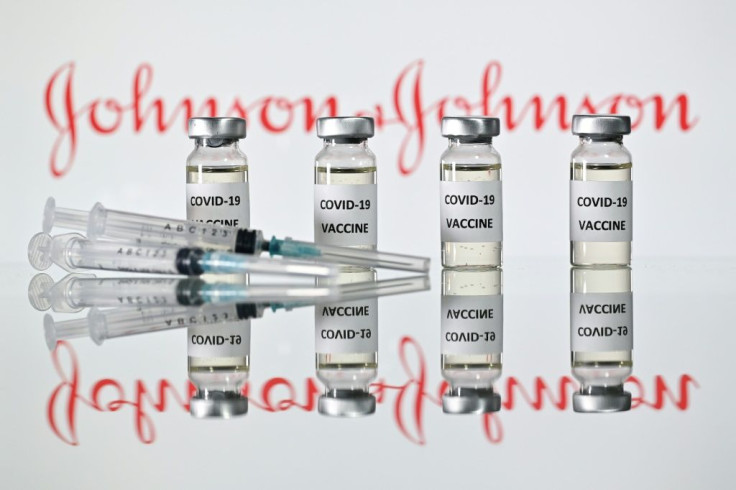More Possible Blood Clot Cases: What Is Known About The Johnson & Johnson Vaccine Recipients
As the Johnson & Johnson COVID vaccine remains on pause under recommendation from the Food and Drug Administration, information about the patients who suffered rare blood clot disorders after getting the shot has been revealed by Johnson & Johnson (JNJ).
While no link to the cerebral venous sinus thrombosis – brain blood clots – and the Johnson & Johnson COVID vaccine has been determined at this time, the FDA and the Centers for Disease Control and Prevention are analyzing a number of confirmed cases of people that had blood clots after being administered the shot from the manufacturer.
The one-dose Johnson & Johnson vaccine has been given out to more than 6.8 million people. Initially, the FDA said that there were six confirmed cases to have the rare but severe blood clot disorder. Cedars Sinai says on its website that cerebral venous sinus thrombosis only affects about five people in 1 million each year.
During Wednesday’s Advisory Committee on Immunization Practices, more cases of the blood clot disorder were revealed. Here, it was debated whether to lift the pause put in place by the FDA or set certain group limits for vaccinations of the Johnson & Johnson shot as the blood clots had primarily occurred in women aged 18 to 48.
The committee determined that it needed more time and information to review the cases before it could make its final recommendation.
For the six initially confirmed cases, it is known that they were all white females with a median age of 33 who had received the Johnson & Johnson vaccine. They developed a headache, a common symptom of the blood clot, within a week or two of the shot.
Some of the women also reported having muscle aches, chills, fever, back pain, and labored breathing, which can be typical effects of the vaccine, but the severity of which they had the symptoms were not.
The women were found to have cerebral venous sinus thrombosis. This disorder forms a blood clot in the bran’s sinus veins and prevents the blood from draining out of the brain, according to Cedars Sinai.
The six women initially confirmed by the FDA included a 45-year-old Virginian who has died. She received the Johnson & Johnson shot in March, dying less than one month after inoculation. She was also hospitalized with serious adverse symptoms prior to her death.
Another patient, a 48-year-old Nebraska woman, who had an “unremarkable” medical history, remains critically ill. She was taken to the ER after three days of malaise and abdominal pain.
Another woman, who was 38, has not recovered after being diagnosed with cerebral venous sinus thrombosis.
A fourth woman, 59, received the Johnson & Johnson vaccine and seven days later was presented with extensive deep venous thrombosis on her left side. She has not yet recovered.
A fifth woman, who is 18 and from Nevada, had unknown risk factors and received the shot. She was diagnosed with cerebral venous sinus thrombosis two weeks later and has not recovered.
The six confirmed case was a 26-year-old woman with obesity from the New Jersey-Pennsylvania region who received the vaccine and seven days later experienced symptoms. She has since been discharged from the hospital.
Three possible additional cases have also been revealed by Johnson & Johnson, including a 25-year-old man that received the vaccine during a clinical trial on Sept. 21, 2020, a company representative said during the advisory meeting.
The man was hospitalized with a cerebral hemorrhage eight days after receiving the Johnson & Johnson vaccine when he suffered from fatigue, faintness, and headache, followed by abdominal pain. He underwent several procedures and was later discharged from the hospital. He is listed as being in recovery.
In another case, a woman suffered a cerebral hemorrhage after receiving a placebo during trials. She was 24, the Johnson & Johnson rep said during the advisory meeting.
A third new case, a 28-year-old female, is listed as being "in processing" with "details pending" as of Wednesday.
The CDC recommends that anyone who has recently received the Johnson & Johnson vaccine be on alert for severe headaches, severe abdominal pain, or shortness of breath within a week to three weeks after inoculation.
If these symptoms occur, it is imperative to see immediate medical attention, mentioning that the COVID vaccine has been administered and avoiding the blood thinner heparin as a treatment.
Shares of Johnson & Johnson were trading at $159.40 as of premarket hours on Thursday, down 52 cents or 0.33%.

© Copyright IBTimes 2024. All rights reserved.




















